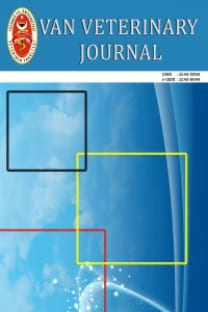Travma Sonrası Paraparezi Olan Bir Kedinin Rehabilitasyonu
Kedi, Parapleji, Rehabilitasyon
Travma Sonrası Paraparezi Olan Bir Kedinin Rehabilitasyonu
Cat, Paraplegia, Rehabilitation,
___
- ACPAT Committee Member Animal Physiotherapy (2009). Pembroke House, MiddleLane, Shotteswell, Oxfordshire OX17 1JQ. Vet Rec, 165 (14) 418.
- Akata F (2001). Özel hasta Gruplarında İnfeksiyon Kontrolü: Spinal Kord Hasarlı Hastada İnfeksiyon Kontrolü, Hastane Enf Derg, 5, 286–294. Akın F, Anteplioğlu H (1979). Evcil Hayvanlarda Commotio ve Contusio Cerebri Olgularında Klinik Gözlem ve Sağıtım Denemeleri, Ankara Üniv Vet Fak Derg, 26, 203–231.
- Balasubramanian S, Thilagar S (1991). Use of a cart to aid ambulation in a cat following posterior paralysis, Vet Rec, 128 (14), 335.
- Craig LE, Wu O, Bernhardt J, Langhorne P (2011). Predictors of post stroke mobility: systematic review. Int J Stroke, 6 (4), 321–327.
- Dursun N (1998). Myologia. Veteriner Anatomi-I, Medisan Yayınevi, Ankara, s: 241-279.
- Kerwin SC (2010). Osteoarthritis in cats. Top Companion Anim Med, 25 (4) 218–223.
- McGowan CM, Goff L, Stubbs N (2007a). Manuel Therapy. Frontmatter in Animal Physiotherapy: Assessment, Treatmentand Rehabilitation of Animals, Blackwell Publishing, Oxford, UK. pp: 164-175.
- McGowan CM, Goff L, Stubbs N. (2007b). Neurological Physiotherapy. Frontmatter in Animal Physiotherapy: Assessment, Treatmentand Rehabilitation of Animals, Blackwell Publishing, Oxford, UK. pp: 2302
- Özkan C, Sarpel Y, Biçer OS (2007). The effects of exercise on articular cartilage, Acta Orthop Traumatol Turc, 41 (Suppl 2), 13-18.
- ISSN: 2149-3359
- Başlangıç: 1990
- Yayıncı: Yüzüncü Yıl Üniv. Veteriner Fak.
Hakkari Belediye Mezbahasında Kesilen Hayvanlarda Anolocephalidae Türlerinin Yayılışı
Gaziantep Sanayi Atık Sularında Arıtma Öncesi ve Sonrası Ağır Metal Düzeyleri
Hayvanlarda Florozis,Teşhis,Tedavi ve Koruma
Gıdalarımızla Soframıza ve Hayatımıza Giren Toksin: Dioksin
Erol BAYTOK , Nuriye Tuğba BİNGÖL
Travma Sonrası Paraparezi Olan Bir Kedinin Rehabilitasyonu
Deniz İNANOĞLU , Gül BALTACI , Savaş ALKAN
Tek Tırnaklılarda Mide Helmintlerinin Yaygınlığı
Aspiculuris tetraptera ile İnfekte Farelerde Plantago major L.' un Antelmentik Etkisi
İdris TUREL , Erol AYAZ , Hikmet DINC
Florozisli Koyunlarda ACE Aktivitesi
Fatmagül YUR, semiha DEDE, sevim Çiftçi YEĞİN, yeter DEĞER
Hakkari Belediye Mezbahasında Kesilen Keçilerde Sarcosporidiosis'in Yaygınlığı
